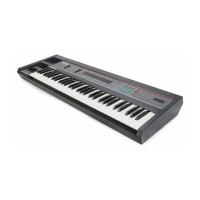SQ-80 — Musician's Manual
TRACKS
ABOUT TRACKS
Because the Synthesizer and Sequencer sections of the
SQ-80 are interrelated in certain ways. it is
important to understand that almost all Sequencer functions have some effect on the Synthesizer —
especially those which deal with
Tracks. Here are a few basic Truths about Tracks:
In General
− There are eight independent, polyphonic Tracks in each Sequence.
___ > A Track can be selected from the
Tracks Select Page or the Mix
•
MIDI Page.
− Only one Track is ever selected at a time.
___ > The selected Track is always underlined.
> Each Track of each Sequence has its own:
Program (Local)
Mix Level (Local, and MIDI for instruments which receive MIDI volume)
MIDI Channel
Status (LOCAL, MIDI. BOTH. or SEQ)
MIDI Program Number (same as Internal Program Number)
___ > When you select a Track, that Track (its Program. MIDI Channel, MIDI Status etc.) "takes over"
the Keyboard — when you play, the Track's Program is the one you will hear: the Track's MIDI
channel is the one that is transmitted on.
___ > When the
SQ-80 is in MULTI Mode (on the MIDI Page), each Track will receive key
information, controllers and Program Changes independently on its own MIDI Channel.
meaning that each Track acts as a "virtual synthesizer." Since the "Straight Synth" also sends
and receives independently, the
SQ-80 is actually nine virtual synthesizers sharing a "pool" o
eight dynamically assigned voices.
___ > When No Track is selected. the Current Program plays on the Keyboard — normal, "Straight
Synth" operation.
When Recording Tracks
> You can only record on one Track at a time.
> When you enter Record, you will always record on the selected Track, and only on that Track. >
When no Track is selected. going into Record automatically puts you on the Track that was last
selected (or Track 1. in the case of a newly created Sequence).
− The length of the First Track you record determines the length of the Sequence (though you
can add or delete bars later if you wish).
___ > Recording on a Track always replaces what was previously there. It is Sound Over Sound. not
Sound On Sound. You can achieve Sound On Sound. in which new Track data is added to the
old, by Merging two Tracks together. an EDIT function.
Section 4 — The Sequencer
93

